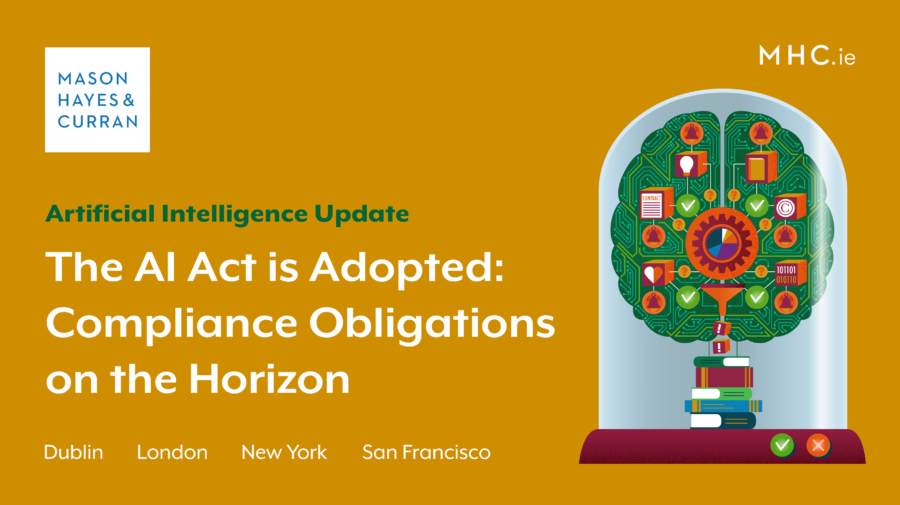The AI Act is Adopted: Compliance Obligations on the Horizon

Following the Council of the EU’s approval of the AI Act, Ireland’s Department of Enterprise, Trade and Employment has now opened a public consultation on its implementation, seeking stakeholder input until 16 July 2024. Brian McElligott, Head of Artificial Intelligence, examines the implications for businesses and their compliance strategies.
The Council of the EU approved the AI Act on 21 May 2024 and it is now expected to enter into force by June 2024. With the exception of certain provisions of the AI Act, such as prohibited AI, the main obligations will apply two years after it commences. Oversight will be managed by national supervisory authorities including:
- The AI Office
- The AI Board
- A scientific panel, and
- A stakeholder advisory forum.
Following the announcement of the adoption of the AI Act, Ireland’s Department of Enterprise, Trade and Employment announced the opening of the public consultation on the implementation of the AI Act. The consultation is open until 5pm, Tuesday 16 July 2024.
Obligations and requirements
The EU Transport, Telecommunications and Energy Council (Telecoms Council) adopted the AI Act on 21 May 2024. The AI Act, the first of its kind in the world, seeks to protect the health, safety and fundamental rights of individuals while also fostering safe, innovative and trustworthy AI. While the AI Act recognises the significance of innovation, it aims to balance this against the importance of ethical and responsible AI.
The AI Act adopts a risk-based approach and will regulate AI by imposing obligations such as transparency and conformity requirements. The provisions will apply to various persons including AI providers, deployers, importers, distributors and users in the EU. The obligations will be phased in over a period of three years, with the first key obligations on prohibited AI applying six months after the AI Act comes into force.
Governance structure
The European Commission has initiated the development of the EU-level governance structure, setting up the AI Office within DG CNECT in February 2024. The AI Office will be tasked with implementing, monitoring, and supervising AI systems and general-purpose AI models under the AI Act. An independent scientific panel will support the AI Office. In addition, an AI Board composed of Member States’ representatives will serve as an advisory body, guiding the Commission on the design of codes of practice for foundational models. An AI Committee will be established to adopt Commission implementing acts. Member States will designate market surveillance authorities who will oversee the regulation of AI systems under the Market Surveillance Regulation.
Consultation opens
The Department of Enterprise, Trade and Employment (DETE) will lead the national implementation of the AI Act in Ireland. In association with other government bodies, the DETE is exploring various approaches to the enforcement of the AI Act. The DETE has published its consultation on the national implementation of the AI Act. The consultation aims to shape Ireland’s strategy for implementing the AI Act, and in particular, the designation and responsibilities of competent authorities here in Ireland.
The consultation contains four questions which cover issues such as:
- Who should be designated as the national competent authority,
- What potential synergies between the AI Act and other digital legislation can be realised, and
- How implementation can accelerate investment and innovation of AI in Ireland while also supporting Ireland’s national AI strategy.
The consultation is open to all stakeholders, including businesses and civil society organisations. The consultation will close at 5pm on Tuesday, 16 July 2024.
Next steps
The AI Act is expected to enter into force before the end of June 2024 with the first provisions on prohibited AI applying from sometime in December 2024. All businesses involved in the development, deployment, oversight or utilisation of AI will need to assess their use of AI to ensure compliance with the AI Act. In particular, providers of AI systems in medical devices, software as medical devices and invitro medical devices should take note that the 3 year implementation period for high-risk AI systems will shortly begin. Those who wish to participate in the consultation should start preparing responses.
For more information, guidance and expert advice, contact a member of our Artificial Intelligence team.
The content of this article is provided for information purposes only and does not constitute legal or other advice.
Share this:




